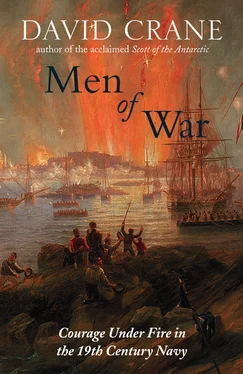With all the ‘dash’ and patronage in the world, a man-of-war like Neptune , with her 116 marines and ship’s company of 570 brawling, drunken, thieving seamen recruited or pressed from across the globe, was a tough school for any boy. ‘Who can paint in words what I felt?’ Edward Trelawny, whose path would later cross with Hastings’s in Greece, histrionically recalled his first days as a thirteen-year-old midshipman in that summer of 1805. ‘Imagine me torn from my native country, destined to cross the wide ocean, to a wild region, cut off from every tie, or possibility of communication, transported like a felon, as it were, for life … I was torn away, not seeing my mother, or brothers, or sisters, or one familiar face; no voice to speak a word of comfort, or to inspire me with the smallest hope that anything human took an interest in me.’
Trelawny had his own sub-Byronic line in self-pity and self-dramatisation to peddle, but even in Neptune and under a captain like Fremantle, there were no soft edges to the gunroom. ‘I thought my heart would break with grief,’ William Badcock, a fellow ‘mid’ in Neptune when Hastings joined, recalled. ‘The first night on board was not the most pleasant; the noises unusual to a novice – sleeping in a hammock for the first time – its tarry smell – the wet cables for a bed carpet … Time however reconciles us to everything, and the gaiety and thoughtlessness of youth, added to the cocked hat, desk, spy-glass, etc of a nautical fit out, assisted wonderfully to dry my tears.’
And for all the brutal horseplay – ‘sawing your bed-posts’, ‘reefing your bed-clothes’, ‘blowing the grampus’ (sluicing a new boy with water) – and the ever-present threat of the ‘sky parlour’ or masthead for punishment, there was none of the institutional or private tyranny in Neptune so vividly recorded in Trelawny’s Adventures of a Younger Son . A midshipman coming off watch might spend his first half-hour unravelling his tightly knotted blanket in the dark, but with cribbage and draughts to play, book work to be done and stories of Captain Cook to be wheedled out of the old quartermaster, Badcock did his ‘fellows in Neptune the justice to say that a more kind-hearted set was not to be met with’.
Hastings did not have long in Plymouth to acclimatise himself to this new world. On 17 May, after a hasty refit, the Neptune was ready again for sea. ‘I begin my journal with saying that I have passed as miserable a day and night as I could well expect,’ Fremantle complained to his wife Betsey the same night, as his sluggish-handling new ship pitched and rolled in heavy seas and Plymouth, home and family slipped below the horizon:
tho’ I have no particular reason why that should be the case … I dined with young Hastings only on a fowl and some salt pork, as triste as a gentleman needs to be … my mind hangs constantly towards you and your children, and I am at times so low I cannot hold up my head … my only hope is in a peace, which I trust in God may be brought about through the mediation of Russia. These French rascals will never come out and fight but will continue to annoy and wear out both our spirits and constitutions.
This two-month cruise with the Channel Squadron gave Hastings his first experience of blockade work, and after another brief refit at Plymouth he was soon again at sea. Fremantle had no more real belief in bringing the French out to battle than he had ever had, but by 3 August they were once more off Ushant and before the end of the month had joined Collingwood’s growing squadron blockading the enemy fleets inside Cádiz. ‘I am in hope Lord Nelson will come here as nobody is to my mind so equal to the command as he is,’ Fremantle wrote to his wife on 31 August:
it will require some management to supply so large a force with water and provisions, and as the combined fleets are safely lodged in Cadiz, here I conclude we shall remain until Domesday or until we are blown off the Coast, when the French men will again escape us. I can say little about my Ship, we go much as usual and if any opportunity offers of bringing the Enemy’s Fleet to battle, I think she will show herself, but still I am not half satisfied at being in a large Ship that don’t sail and must be continually late in action.
They might well have stayed there till doomsday, but while Fremantle fretted and flogged, a messenger was already on the road to Cádiz with orders for the French Admiral Villeneuve to take the fleet into the Mediterranean in support of the Emperor’s new European ambitions. From the collapse of the Peace of Amiens Napoleon’s naval strategy had been marked by an utter disregard for realities, but this time he had excelled himself, timing his orders to arrive on the very day before Fremantle and the whole blockading fleet at last got their wish for Nelson. ‘On the 28th of September was joined by H.M. Ship Victory Admirl Lord Nelson,’ wrote James Martin, an able seaman in Neptune , ‘and the Ajax and the Thunderer it is Imposeble to Discribe the Heartfelt Satifaction of the whole fleet upon this Occasion and the Confidance of Success with which we ware Inspired.’
‘I think if you were to see the Neptune you would find her very much altered since you were on bd,’ Fremantle told Frank’s father, sloth, dyspepsia and ill-temper all dispersed by a single dinner with Nelson and the promise of the second place in the line in any coming action. ‘We are all now scraping the ship’s sides to paint like the Victory [black, with buff-coloured stripes running between the portholes], the fellows make such a noise I can hardly hear myself. Pray make my respects to Mrs Hastings & beg her [to have] no wit of apprehension about her son who has made many friends here, & who is able to take his own part.’
Opinions were still divided as to whether or not the French would come out, but with five ‘spy’ frigates posted close in to the city, and Nelson’s battle plan circulated among the captains, the fleet knew what was expected of them. In the brute simplicity of the tactics Hastings was to learn an invaluable lesson, but the great danger of breaking the line in the way Nelson intended was that it ceded the opening advantage to the enemy, exposing a sluggish handler like Neptune in the light October breezes to the full enemy broadsides for anything up to twenty minutes before she could get beneath a foe’s vulnerable stern.
Nobody in Neptune was under any illusion as to what that would mean, but nothing could contain the excitement when the signal from the inshore squadron finally came. ‘All hearts towards evening beat with joyful anxiety for the next day,’ Badcock wrote on 20 October, as Neptune answered the signal for a general chase, ‘which we hoped would crown an anxious blockade with a successful battle. When night closed in, the rockets and blue lights, with signal guns, informed us the inshore squadron still kept sight of our foes, and like good and watchful dogs, our ships continue to send forth occasionally a growly cannon to keep us on the alert, and to cheer us with the hope of a glorious day on the morrow.’
As partitions, furnishings and bulkheads were removed, decks cleared, livestock slaughtered – Fremantle had a goat on board that had provided him with milk – Neptune turned south-west to give her the weather gage in the coming action. From the signals of their ‘watchdogs’ they knew that the enemy were still moving in a southerly direction, and as dawn broke on 21 October, first one sail and then a whole ‘forest of strange masts’ appeared some eleven miles to leeward to show that the Combined Fleet was at last where Nelson wanted it.
The sun, William Badcock – midshipman of the forecastle and first in Neptune to see the enemy – remembered, ‘looked hazy and watery, as if it smiled in tears on many brave hearts which fate had decreed should never see it set … I ran aft and informed the officer of the watch. The captain was on deck in a moment, and ere it was well light, the signals were flying through the fleet to bear up and form the order of sailing in two columns.’
Читать дальше











